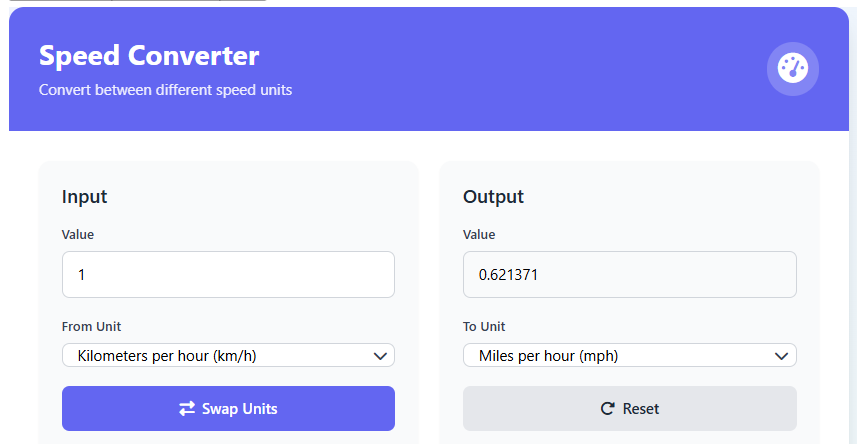Speed Converter
Convert between different speed units using speed converter
Input
Output
Common Speed Conversions
| Unit | km/h | mph | m/s | knots |
|---|
Speed Reference
Common Speeds
- Walking speed: ~5 km/h (3.1 mph)
- Running speed: ~15 km/h (9.3 mph)
- City driving: ~50 km/h (31 mph)
- Highway speed: ~100 km/h (62 mph)
Fast Speeds
- Commercial jet: ~900 km/h (560 mph)
- Sound speed: ~1,235 km/h (767 mph)
- Space station: ~27,600 km/h (17,150 mph)
Speed Converter © 2023 | Made with
Speed Converter: Your Key to Understanding Velocity Measurements
Have you ever wondered how fast you’re traveling when abroad or how to compare athlete speeds? Different countries use different speed units, which can be confusing. Fortunately, a Speed Converter makes it simple and quick to understand. This helpful online tool translates speed measurements instantly, and therefore, it helps travelers, students, and sports fans compare velocities easily.
Speed Converter Explains Different Velocity Units
First, let’s understand what speed units mean. Basically, speed measures how distance changes over time, but various systems exist worldwide. For example, the US uses miles per hour (MPH) while most other countries use kilometers per hour (KPH). A Speed Converter knows all the conversion formulas between these units. You simply input your speed value, select its current unit, and choose your desired unit. Then, the calculator provides the converted value immediately. Consequently, you can understand speeds regardless of their original measurement system.
Speed Converter Helps in Many Practical Situations
Moreover, this tool isn’t just for scientists; it’s incredibly useful for many daily activities. A Speed Converter serves as a versatile helper for travel, sports, and education.
For International Travel and Driving
When driving in foreign countries, speed limit signs might use unfamiliar units. By using a Speed Converter, you can quickly understand local speed limits, and therefore, you can drive safely and avoid traffic violations.
For Sports and Athletics Coaches
Coaches often need to compare athlete performances across different events and countries. A Speed Converter helps them standardize speed measurements, and consequently, they can better analyze performance and progress.
For Students Learning Physics
Furthermore, physics students frequently work with different measurement systems. A Speed Converter helps them verify calculations, understand unit relationships, and as a result, develop a stronger grasp of velocity concepts.
Speed Converter Makes Unit Conversion Simple
So, how do you use this fantastic tool? It’s designed to be very user-friendly. First, you enter your speed number, Next, you select its current unit (like MPH or KPH), Then, you choose the unit you want to convert to. The Speed Converter processes the conversion instantly and displays the result. As a result, you get accurate conversions without manual calculations. In conclusion, understanding speed measurements is easier than ever, and this tool on Tooltura is the perfect, free tool to help you. Try it today to become a speed conversion expert!

Frequently Asked Questions
Q1: What is an online speed converter and how does it work?
A: This tool is a digital tool that, first, allows you to input a speed value. Then, you select your current unit and target unit, and subsequently, it instantly calculates the converted speed using precise conversion formulas.
Q2: Why should I use a MPH to KPH converter for international travel?
A: You should use a MPH to KPH convert for international travel because speed limits differ between countries; consequently, this tool helps you understand foreign road signs and, therefore, drive safely while abroad.
Q3: Can a knots to mph converter help with maritime and aviation activities?
A: Absolutely, a knots to mph converter is essential for maritime and aviation use. It converts nautical miles per hour to statute miles per hour, and then provides accurate speed comparisons, which ultimately enhances navigation safety.
(FAQs)
Q4: How does a running speed converter help athletes and coaches?
A: A running speed converters helps by first standardizing various speeds measurements. Then, it allows comparison of performances across different track events, and subsequently, it helps in designing better training programs.
Q5: Is a free speed converter accurate for educational purposes?
A: Yes, a high-quality free tool is very accurate for education because it uses standardized conversion rates. However, for critical applications like aviation, always double-check with official navigation tools.
Q6: What are the benefits of using a universal speed converter?
A: The benefits of a universal speed converters are significant; specifically, it handles multiple unit types in one tool. As a result, users can convert between any speed units quickly and consequently save time on calculations.
Q7: How do I convert km/h to m/s manually?
A: To convert km/h to m/s manually, you first multiply the km/h value by 1000 to convert to meters per hour. Then, you divide by 3600 to convert hours to seconds, and subsequently, you get the speed in meters per second, though using a converters is much faster.